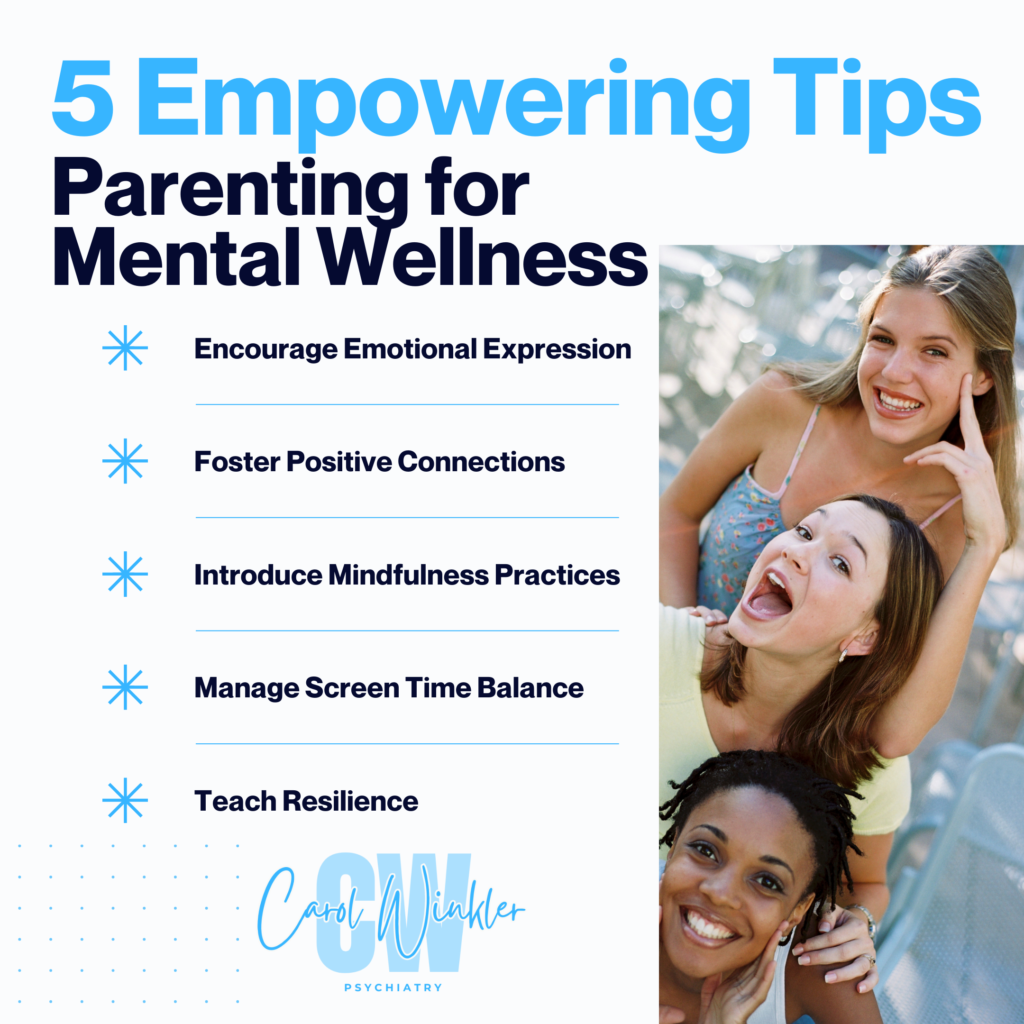 In the journey of parenting, prioritizing the mental well-being of our children and teens is paramount. As caregivers, we play a pivotal role in creating a nurturing environment that fosters emotional resilience and a positive mindset. In this blog, we’ll delve into five empowering tips to support your child’s mental wellness, and we’ll emphasize the importance of seeking professional help when needed, with a special mention of the services offered at Carol Winkler Psychiatry.
In the journey of parenting, prioritizing the mental well-being of our children and teens is paramount. As caregivers, we play a pivotal role in creating a nurturing environment that fosters emotional resilience and a positive mindset. In this blog, we’ll delve into five empowering tips to support your child’s mental wellness, and we’ll emphasize the importance of seeking professional help when needed, with a special mention of the services offered at Carol Winkler Psychiatry.
- Encourage Emotional Expression 🎭: One of the foundations of a healthy emotional life is the ability to express feelings openly. Creating a safe space for our children to share their emotions helps build trust and understanding. Engage in open conversations about their day, ask about their feelings, and be a compassionate listener. When children feel heard and supported, they develop emotional intelligence and resilience.
- Foster Positive Connections 🤝: Building strong, positive relationships is crucial for a child’s overall well-being. Encourage meaningful connections within the family and support the development of friendships. Social support acts as a buffer against stress and provides a network for emotional sharing. It’s in these connections that children find comfort and strength.
- Introduce Mindfulness Practices 🧘♂️: Mindfulness exercises can be powerful tools for managing stress and promoting mental clarity. Explore simple practices such as deep breathing or short meditations with your child. By incorporating mindfulness into their daily routine, you help them develop self-awareness and the ability to stay present in the moment, fostering a sense of calm.
- Manage Screen Time Balance 📱: In today’s digital age, balancing screen time is essential for a well-rounded childhood. Set healthy limits on device usage to ensure a harmonious blend of online and offline activities. Encourage outdoor play, creative endeavors, and quality family time. A balanced approach to technology contributes to a child’s overall mental and physical health.
- Teach Resilience 💪: Life is full of challenges, and teaching children resilience equips them with the skills to navigate adversity. Help them view setbacks as opportunities for growth and learning. Building resilience involves fostering a positive mindset, problem-solving skills, and the ability to bounce back from life’s curveballs.
Reaching Out for Professional Help
While these tips lay a strong foundation, it’s essential to recognize when professional support is needed for the mental well-being of our children and teens. If you notice persistent signs of emotional distress, behavioral changes, or if your child is struggling with mental health challenges, seeking help is a proactive step.
At Carol Winkler Psychiatry, we offer a range of mental health services tailored for children and teens. Our team of experienced professionals is dedicated to providing personalized care and support. Whether it’s managing anxiety, depression, or addressing behavioral concerns, our services are designed to meet the unique needs of young minds.
As parents, our commitment to our children’s mental well-being is a journey of love and understanding. By implementing these empowering tips and being vigilant to signs that may indicate a need for professional help, we create a resilient foundation for our children to thrive. At Carol Winkler Psychiatry, we stand ready to support you and your family on this journey towards optimal mental health and well-being. Remember, seeking help is a courageous and proactive step towards ensuring the best possible future for your child.

Comments are closed